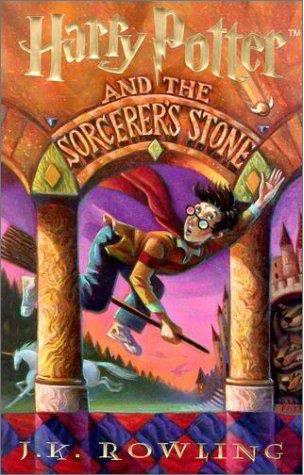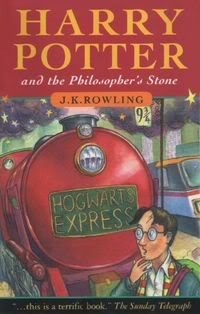INTERVIEW: Barry Cunningham, Part 1
By Therese Walsh | December 8, 2006 |
 Barry Cunningham is the Publisher and Managing Director of The Chicken House, an imprint of Scholastic Inc., the largest publisher and distributor of children’s books in the world. Barry Cunningham has personally discovered some of the biggest names in children’s fiction today, including J.K. Rowling (Harry Potter series) and Cornelia Funke (Inkheart, Dragonrider). He recently spoke with Writer Unboxed about his journey as a publisher, discovering Harry Potter and much more. We’re deeply honored to have him with us.
Barry Cunningham is the Publisher and Managing Director of The Chicken House, an imprint of Scholastic Inc., the largest publisher and distributor of children’s books in the world. Barry Cunningham has personally discovered some of the biggest names in children’s fiction today, including J.K. Rowling (Harry Potter series) and Cornelia Funke (Inkheart, Dragonrider). He recently spoke with Writer Unboxed about his journey as a publisher, discovering Harry Potter and much more. We’re deeply honored to have him with us.
Part 1: Interview with Barry Cunningham
Q: Tell me a little about yourself. How did you start in the publishing business and what has your journey been like?
BC: I started in marketing children’s books. I traveled the UK with Roald Dahl, among other people, and really learned the difference between what children respond to and really like, and what they’re told to like. Roald Dahl had a very physical relationship with the whole market. He looked like a big friendly giant, and he entranced people with his storytelling and his writing. His relationship with the children was really about being on their side. Really his message was something that teachers and educators didn’t respond to as much but children understood, and that was: Beware of adults!
So I spent a lot of time working with authors and traveling around with Roald Dahl and just soaking it all in. I really learned my craft about this business by watching children respond to books. Books children love they love almost physically. The books that they love they kind of physically hug and don’t want to give back, and the relationship with the author is part of that.
Though I spent time promoting books for adults early in my career, I was drawn back to children’s books, and when Bloomsbury asked me to do a report on starting children’s list, I thought, “I can do this. I’m not a proper editor, but I know a lot about children’s books.” So I tried for it. I think it was a good decision!
Q: How do you think your background helped you become a successful children’s editor?
BC: It helps me to come from a background of watching children with books and really listening to what they do and say. I come from a child’s point of view, and because of that, I feel I know what inspires children and what can extend their imagination and take them on a journey. I have a clearer criterion about what should work, so I make “brave decisions” because I’m focused in a different way. Cornelia Funke and I speak to each other, and she calls me a “child at heart.” She is too, really. So I started this list of children’s books for Bloomsbury. We were part of a small publishing house, and they just let me do what I wanted, so I tried to buy and commission and respond to books that children adore. It’s about not letting go of childhood or its sense of wonder.
Q: Tell us about Harry Potter. How did it happen? Was it love at first read?
BC: Harry Potter came along because Jo had been turned down by everybody already. I believe she chose her agent, Christopher Little, because his name sounded nice, but he was really an adult author’s agent. I really don’t think he had any other children’s book authors, but he knew my background and knew what I was looking for, so he sent me Harry Potter. I’m sure he had read it, but I’m not sure he knew what he had. I read it, and really the sky didn’t part and the lightning didn’t come down, but I just really liked it.
Q: What made you like it enough? What snagged you? The first few pages? The seven book potential?
BC: The first few pages, I believe, and that feeling of Harry being alone in a horrible situation and needing help. Magic happening. The promise of things to come. It all seemed wonderfully exciting.
Q: How did things evolve from there?
BC: Jo came down to see me and we talked about the series. What really struck me and what was amazing at that time was that Harry was going to grow up with every book. It was really revolutionary, because in other series the children didn’t really grow up and their challenges didn’t change. Jo had also worked up exactly what was going to happen in all seven books, and she cared about it—she cared about her story in enormous detail. I bought the books and everything started out quietly really. We didn’t have a huge amount of money to promote the books, but that didn’t seem to be the key. They won a children’s prize, and children responded to them.
Q: When did you know you had magic?
BC: I know when. I went to my children’s school for a conference, and this eleven-year-old girl was there to take me down to the classroom, and she was holding HARRY POTTER. She did what I always dreamed of really, she hugged the book and said, “I really love this book,” and I knew then that it was going to work, that I’d published the book I’d always wanted to publish—a book that children would love. And then you know what happened, of course; Jo became a superstar. But I talk to her regularly. A few years ago, at the height of the mania, she called me up and said she thinks it’s all a dream and that she’ll wake and find it hasn’t really happened, that she isn’t really living in a castle.
WU: She really is living the fairy tale.
BC: She is. And she’s just fantastic. She’s as keen and meticulous about Harry as the most avid of her fans. She cares deeply about her story. It’s a remarkable thing, really, what she’s done. It used to be the boys would have enough trouble to read the back of a PlayStation package, forget about the books. But now they turn out for the books, they want to read them, and it isn’t a Disney-backed phenomenon.
Q: Being on the NY Times Bestseller list for so many years – that’s why they created a children’s list, wasn’t it? Because of Harry Potter?
BC: Yes. Jo really opened things up for other writers. Children’s stories were never as varied as they are now. The lesson from Jo is that the truly lasting children’s authors are just that—children’s authors. They’re still writing directly about experiences about childhood, but they’re not aiming at this ghastly phenomenon cross-over thing; they’re not aiming at adults. And I think children’s writing still has to be absolutely true to the child’s experience to work.
Q: What about fantasy as a genre? Any rules?
BC: It still has to be about the child’s experience, but we’ll see a big struggle of good and evil. You know, children’s writing that survives has characters that speak to the children because their reaction to that fantasy experience resonates with them—they believe it. That’s what makes it last. Narnia, Phillip Pullman’s books, Cornelia’s or Jo’s work—these really come alive through well-drawn characters and their reactions to events. Orcs by themselves aren’t going to do it.
Q: Authenticity, in a child’s mindset. How important is it?
BC: That’s really important. A lot of adult writers are drawn to the children’s market, but they often don’t come to it with the sense of humility that successful children’s writers have for their readership and for the essence of childhood, and so I don’t think many of them do work. They may work for a season, but they certainly won’t work for a long period. They may last generationally, your daughter may read them, but they won’t be around longer.
Q: We seem to be in a real children’s book boom right now. So many of the books seem to be breaking boundaries. It’s hard to decide what to read. Do you see this? What’s happening?
BC: I think it’s a fantastic really rebirth of children’s books we’re seeing right now. I worked in the first golden age of golden books, in the late 60s, mid 70s, with lots of fantastic writing going on, but this is a more important golden age; the variety is greater and I think we’ve lost the slightly condescending attitude the writer had to children. Now authors are directly writing without condensation to children—like Cornelia Funke, Jo Rowling, Phillip Pullman—and they are speaking directly to them.
Click below for part 2 of WU’s interview with Barry Cunningham, where we’ll learn his opinion on plot vs. voice in children’s literature, tips for the aspiring children’s novelist and more about the Chicken House imprint!










Fascinating. This is an absolutely fascininating interview. Thank you, Therese, for your hard work in this!
ter, great questions. you really landed an interview with someone in the ‘know’ about what’s happening in children’s books. i just attended a children’s book faire and it was interesting what scholastic was selling. animal centered books were big as well as fantasy.
Thank you for a wonderful interview. My husband, my son, and I eagerly await each HP as they come out in book and movie form.
Great interview, and with such a big gun in the industry :) Good job.
Thanks to all for comments on the interview. It was a real pleasure to speak with Barry, and I’m so glad you’re all enjoying the transcript. :)
This interview has got to be the best source of information I’ve come across in quite some time! Amazing work. Thank You!